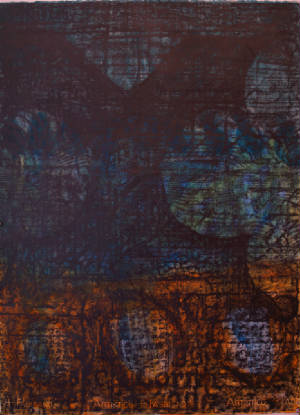|
|
 |
|
~~~~~~~~~~~~~~~~~~~~~~~~~~~~~~~~~~~~~~~~~~~~~~~~~~~~~~
|
 |
|

|
| Michael Dunn, Kellogg Manor |
Ray
Marsocci
Acts
of Contrition
Our
vegetables grow well this year,
foliage
fanned and shading the squash,
carrots,
bean curls, tomato stalks
crossed
along our land’s hem,
yet
the lilac flowered then was gone, and lilies
rust
the yard’s swift green, while about the bed
honeysuckle
rosaries, frothing like garnish.
None
of this—
None
of this is what I want.
This
morning I carried my wife up the stairs again,
two
a.m. and she dropping drunk, waking me.
It’s
her garden, but in my wife’s life
the
sermon is disease, her gospel
a
reading from the incurable.
It
is her garden, but I tend it, my penance
my
weeding, my digging with my hands,
my
kneeling with the flies
in
the garden’s sullen soil, a purgatory
hymned
brown—saturated, softened—
my
hoping to solve its complication of weeds,
the
slight wind’s shadow, the light’s hymnal,
late
summer’s surprising chill.
~~~~~~~~~~~~~~~~~~~~~~~~~~~~~~~~~~~~~~~~~~~~~~~~~~~~~~~~~~~~
Ray Marsocci, who remains employed in working on a novel but otherwise not so employed for several months now,
has published his poetry and fiction in such places as Quarterly West, New Delta Review,
La Fusta, and Green Mountains Review.
~~~~~~~~~~~~~~~~~~~~~~~~~~~~~~~~~~~~~~~~~~~~~~~~~~~~~~~~~~~~
Conrad
Hilberry
No Creases
New born up there, the snow
is
tossed into the cold
by a sky that has other things
to think about—GPS agents
bouncing their signals
off
its airy elbow. On its own,
snow is an avenue of absences,
houses all addressed
in zeroes, no roofs,
no curbs,
no shadow to shape the day,
only some twisted wood
against the sky. The mailman
has
given up, can't find the sack
he dropped behind
some bush. Who was I
in those creased trousers,
shaking
someone's
hand? Whatever was
is blown and gone. A moment
of sun on the drifts—
the
world waving on its way out.
~~~~~~~~~~~~~~~~~~~~~~~~~~~~~~~~~~~~~~~~~~~~~~~~~~~~~~~~~~~~
Conrad Hilberry taught in the Kalamazoo College English Department for many years. His most recent books are After-Music, 2008, Wayne State University Press, and This Awkward Art,
a father-daughter collection, matching his poems with those of his daughter Jane Hilberry, who teaches at Colorado College. It was published in 2009 by Mayapple Press.
~~~~~~~~~~~~~~~~~~~~~~~~~~~~~~~~~~~~~~~~~~~~~~~~~~~~~~~~~~~~
James Cihlar
In the Name of the Mother
Holy mother, full of grace, you’ve
opened the window.
Blessed is the white northern sky with
birch rising up to meet it, and blessed is
the
brood cat living in the garage, Sally.
Blessed are the quiet streets around Viola’s house,
And blessed
is the floor of Lake Superior
Under a domed night, a tanker docked in silhouette.
Blessed is Kathleen’s
copy of Esquire,
A naked man diving from a cliff on the cover,
And blessed is her face waking up in hospice,
the
passage from what the fuck to understanding.
Blessed is the all-white room Rhoda designed for Mr. Grant,
And
blessed is the break in the season, the weather turning.
Blessed are Walter Mondale and Geraldine Ferrarro,
“Philadelphia
Freedom” and Birchbark Books.
Patron saint of the unexpected, pray for our winters
Of cream, silver,
and brown unfolding from the open door,
Forever tinting Fisk and Avon, Mackubin and Arundel,
The city blocks of Cathedral
Hill. Monster of God,
Give us our trespasses so that we may escape.
~~~~~~~~~~~~~~~~~~~~~~~~~~~~~~~~~~~~~~~~~~~~~~~~~~~~~~~~~~~
James Cihlar’s book
of poems, Undoing, was published by Little Pear Press in 2008. His poems have appeared in Prairie Schooner, Bloom, Minnesota Monthly, Northeast, The James White Review, Wisconsin
River Valley Journal, Water~Stone Review, Mankato Poetry Review, Briar Cliff Review, Plain Songs, Verse Daily, and in
the anthologies Aunties (Ballantine), edited by Ingrid Sturgis, Regrets Only (Little Pear Press), edited
by Martha Manno, and Nebraska Presence (Backwaters Press), edited by M.K. Stillwell and Greg Kosmicki. The recipient
of a Minnesota State Arts Board Fellowship for Poetry and a Glenna Luschei Award from Prairie Schooner, Cihlar lives
in St. Paul, Minnesota.
~~~~~~~~~~~~~~~~~~~~~~~~~~~~~~~~~~~~~~~~~~~~~~~~~~~~~~~~~~~~
Judith Skillman
Deciduous
We all of us change colors and become
worthless.
Our bodies trunk-like, our skin like raw silk, chafed
by the clothes we use to cover nakedness.
We
lose our hands, cheat ourselves of the use of digits
for a whole season, gone fallow with chores
instead of putting
thought through its paces.
We search the blackness for light from other houses,
stars, or airplanes caught
between the branches
of maple, cherry, poplar. Our veins stand out
blue on the bones of our wrists.
We like to think happiness
can last as long as the memory of happiness,
that the dream of erotica might substitute for
Eros.
In this way we resemble those trees lining streets
of upstate New York. Leaves gathered in piles
wait
to be lifted by the truck that comes on Tuesdays.
Ruddy-faced, orange-hearted, or just plain yellow—
we’re
like the drift of autumn tidy now and feather-light,
raked by husbandry into its place curbside.
š
Scrim
As
from behind cotton blouson…
French lace fed by breeze or presage.
The what-not of history
like run-off spilling from glacier.
The hanging of such linen from a one-way draw rod.
As before
the Montreal fire in a theatre where characters are seen before a façade of paper flames.
The Mama, Papa, the
petite bébé who chose or did not choose its parents.
To be swaddled in flannel…
Ah, Quebec.
Where
trains run silently back and forth from Greenfield Park to the Creperie.
Come, enter the fourth wall.
Cross
the boundary, he would say.
Keep this secret safe from the others.
As with his dollars he fed those
chicks hatched under a sun lamp.
~~~~~~~~~~~~~~~~~~~~~~~~~~~~~~~~~~~~~~~~~~~~~~~~~~~~~~~~~~~
Judith Skillman’s twelfth
book The Never is forthcoming in 2010 from Dream Horse Press. The recipient of an award from the Academy of
American Poets for her book Storm (Blue Begonia Press, 1998), Skillman’s work has appeared in Poetry, FIELD,
The Southern Review, The Midwest Quarterly, Seneca Review, and numerous other journals and anthologies. A writer,
educator, and editor, Skillman holds an M.A. in English Literature from University of Maryland, and lives in Kennydale, Washington.
~~~~~~~~~~~~~~~~~~~~~~~~~~~~~~~~~~~~~~~~~~~~~~~~~~~~~~~~~~~
Margaret Walther
Perhaps About to Be Swept Away
(Violin Construction, Cremona, Linda Butler, black & white photograph)
praise to the tools—
the saws, gouges for rough arching, the chisels
knives, the thumb plane which
allows for the precise contour
the reamer for peg holes
steel scrapers to execute the finale
all that prepare willow, maple, ebony, spruce for its debut
praise to the hands—
and
their acquired cache of memory—
the tappers of blocks, makers
and setters of backs, fronts, ribs, f-holes, scrolls, purfling
do not forget to praise that which is planed,
gouged, reamed, knifed, scraped out—
the extraneous, superfluous, redundant
all that must be sacrificed—to present the wood to its voice—
these fragments, stacks of furled backlit shavings
spilling around the roughly planed back and front of the violin
and their attendant epiphany of shadow—
~~~~~~~~~~~~~~~~~~~~~~~~~~~~~~~~~~~~~~~~~~~~~~~~~~~~~~~~~~
Margaret Walther is a retired librarian from the Denver metro area and
a past president of Columbine Poets, an organization to promote poetry in Colorado. She has been a guest editor for
Buffalo Bones, and has poems published in or forthcoming from many journals, including
Connecticut Review, anderbo.com, Ghoti, Quarterly West, Naugatuck River Review, Chickenpinata,
Nimrod and Many Mountains Moving, where she won the 2009 Poetry Contest.
~~~~~~~~~~~~~~~~~~~~~~~~~~~~~~~~~~~~~~~~~~~~~~~~~~~~~~~~~~~
Hal Shows
A Letter from the Occupation
Purely for purposes
of pacification
we are clearing away the enemy's past.
When our officers gesture
across the river to the tiled roofs
and
the hushed cortiles where the cypress rise
their gloved hands are indicating
new highways, necessary eliminations .
. .
My job is mining the bridges.
Today, as I packed the plastic bombs
and fastened fine wire fuse
to the rough
stone of the old foundation,
knee-deep in a heavy current,
something like sleep, a sudden trance
of memory and remorse
ravished me.
I came to stock-still in the shallows,
close to the occupied bank.
Through gathering dusk I could see
desolate
doors of deserted houses swaying ajar.
Betrayed, betraying, I had almost gone over,
though nothing is left in our wake.
~~~~~~~~~~~~~~~~~~~~~~~~~~~~~~~~~~~~~~~~~~~~~~~~~~~~~~~~~~~
Florida poet and musician Hal Shows is a State of Florida Individual Artist Fellow and a member of the National Academy
of Recording Arts and Sciences. A chapbook of his poems, A Breath for Nothing,
was published by the Anhinga Press in 1977. In 1980, Shows founded the post-punk rock band Persian Gulf, with whom he released
Changing the Weather (1984), Persian Gulf:
The Movie (1986), and Trailer (1987). Subsequent solo productions include Birthday Suit (1990), Lifeboat (1995),
Whitman’s Sampler (2000), and Native
Dancer (2003). Shows teaches at Keiser University in Tallahassee, Florida. Parasol,
his first full-length volume of poems, was published in 2007.
~~~~~~~~~~~~~~~~~~~~~~~~~~~~~~~~~~~~~~~~~~~~~~~~~~~~~~~~~~~
Nigel Holt
The Call of Days
The dawn clears slowly from
the sea and dares
day heave its beams upon
the land to lull
the ancients from their
deepest dreams, then pull
the chains of change with
early morning prayers.
Allahu akbar,
Allahu akbar.
The swirling adhan turns the sky, a whorl
that draws the faithful
to repentant light;
its roll-and-tumble tides
of plainsong fight
the smothering grip of night's
enduring caul.
Ashhadu la illaha illa allah,
Ashhadu la illaha illa allah.
But nearer now, one mueddhin draws the dawn;
dark superlatives of moment
resonate
through words replete with
time, to enervate
a world his fourteen centuries
have worn.
Ashhadu anna Mohammedar rasooulallah,
Ashhadu anna Mohammedar rasooulallah,
And one on one they cease
and start to rise
in measured waves that wash
athwart and mingle,
eddy and swell beyond to
bring the tingle
that bristles up from back
to neck to skies.
Hayya ‘alas salaah,
Hayya ‘alas salaah.
Across the living threshold
of the day
a hundred, thousand, million
voices climb
all pointing to the qibla
of the way
together in the search for
their divine.
Hayya' ala Falaah,
Hayya' ala Falaah.
The dawn clears slowly from
the sea and dares
day heave its beams upon
the land and lull
the ancients from their
deepest dreams, then pull
off the chains of change
with early morning prayers.
Allahu akbar,
Allahu akbar.
La illaha illa allah.
Note: The Adhan:
God is great, God is great.
I bear witness that there
is no other god but God.
I bear witness that there
is no other god but God.
I bear witness that Muhammad
is the messenger of God.
I bear witness that Muhammad
is the messenger of God.
Come to prayer, come to
prayer.
Come to success, come to
success.
God is great, God is great.
There is no god but God.
~~~~~~~~~~~~~~~~~~~~~~~~~~~~~~~~~~~~~~~~~~~~~~~~~~~~~~~~~~~
Nigel Holt has lived and worked in the education field in the United Arab Emirates for a number of years. He
has been most recently published in Counterpunch, The Recusant, and Snakeskin magazines. He has work forthcoming in The Raintown Review, The
Anglican Theological Review, The Flea, Soundzine, Decanto and Poetry Salzburg.
He is the editor of The Shit Creek Review.
~~~~~~~~~~~~~~~~~~~~~~~~~~~~~~~~~~~~~~~~~~~~~~~~~~~~~~~~~~~
|
 |
|
|
 |
|
|
 |
|
|
|
|
Feedback, submissions, ideas? Email thesmokingpoet@gmail.com
|
|
|
 |

